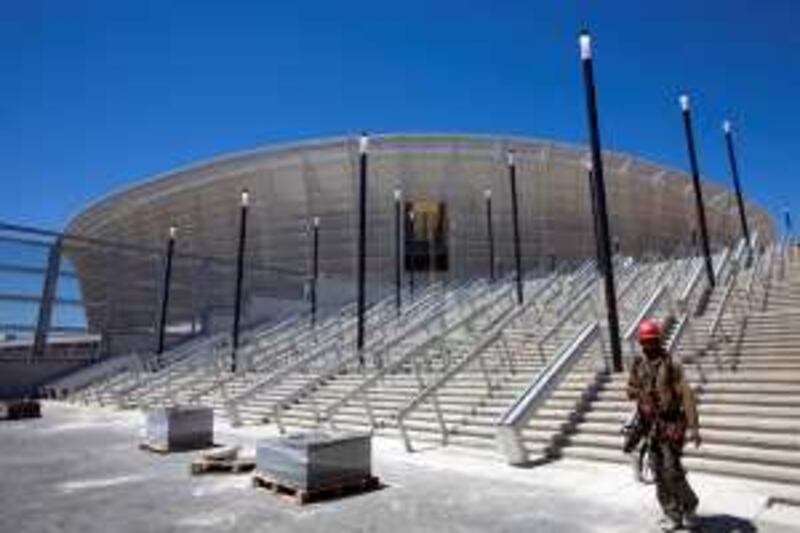CAPE TOWN, SOUTH AFRICA // As the city settles into late-summer languor, it is easy to envision a successful World Cup, now just 104 days away. The dazzlingly new 68,000-seat Green Point Stadium, the site for eight matches, including a semi-final, gleams in the morning sun. Afternoon temperatures hover in the mid-30s. As night falls, men and women crowd the bars and restaurants of the waterfront not far off, where the South African businessman Sol Kerzner, the developer of Dubai's Atlantis on the Palm, has just added a new Xanadu to his menagerie of hotels.
Along with nearby bohemian Long Street, with its verandaed Victorian buildings alongside landmark mosques, a more perfect location to celebrate victory or drown defeat could hardly be imagined. Or so it seems. Yet amid all the fuss about whether South Africa will be ready to host the world's biggest sporting event, what routinely is overlooked is the weather. Yes, the weather. Look at a map or desktop globe and the issue will immediately be clear. Come June, while the northern hemisphere is bathed in summer, the opposite side of the globe - not least, the continent's southern tip - will be nestled deeply in winter.
Cape Town, where France and Uruguay face off on the tournament's opening day, is likely to be cold and wet. At an elevation of 1,753 metres and far inland, Johannesburg, the site of the final, will be freezing. Among the nine cities and 10 stadiums where Africa's first ever World Cup is to be contested, only the Indian Ocean port of Durban can expect good weather. Surprised? You're not alone. When did you last hear a television announcer or an official for Fifa, football's world governing body, refer to "this winter's World Cup"? Case closed.
The impending rain and cold is not foremost on the minds of hundreds of weekend partiers who have converged on M'zolis, an outdoor dance club and bar in the black township of Guguletu, near Cape Town's international airport, to stave off the afternoon's 38-degree heat. The partiers, in their Saturday-night best, pours out onto the street from under a canvas overhang. A portable sound system thumps out a bass beat that seismologists probably can detect two continents away. It is all a respite from the grim realities of a community where unemployment is estimated at 50 per cent and 30 per cent of the 350,000 residents are believed to be HIV-positive.
While the World Cup is eagerly awaited at M'zolis, the winter weather that accompanies it is not. "Don't believe what anybody else tells you differently," chides Benjamin Vencio, 28, an Angolan construction worker who has lived in South Africa for 12 years. "It rains a lot in June and July, sometimes for six or seven days straight. You don't see the sun." The prospect of bad weather is not the only question in the air. There are signs that the love affair with Fifa and its president, Sepp Blatter, is wearing out, too.
Trade union leaders alleged last week that Fifa is importing World Cup-related clothing and souvenirs from China, rather than purchasing them from South African manufacturers. That accusation came on the heels of Fifa's announcement that it would only accredit reporters to cover the tournament who agree not to publish or broadcast anything that will bring the organisation into "disrepute". Fifa officials appeared unaware that this condition mirrored a notorious old apartheid law and violated the South African constitution.
Amid such vitriol, the weather may not be the tournament's biggest problem. International tour operators are reporting a 25-year low in bookings of World Cup travel packages. Furthermore, less than two per cent of the available tickets have reportedly been sold to football fans in African countries outside South Africa. Half-empty stadiums will hurt the all-important global television ratings, which is why Fifa last week announced it was discounting the prices of more than one million tournament tickets, much to the chagrin of those who had already bought them. Local attendance is deemed ever more critical to the World Cup's success.
Yet not even a marked-down ticket may lure Alex Pieters to Green Point from his home in Paternoster, 145km north of here. Mr Pieters, like other white Afrikaaners, favours rugby and cricket, and admits to having little understanding of football. For him - guess what? - weather will be a critical factor. "If it's a sleeting rain, they'll have to play. But I'm not sure I'll go. It'll be more comfortable to sit on the sofa in front of the telly," Mr Pieters said.
Inclement weather and soggy, if not frozen, pitches may not faze some football fans - Scots, Norwegians and Russians come immediately to mind. This World Cup was already poised to be a salutary reminder that many, if not most, of the hundreds of millions of people who play, watch and cherish the game are poor. What this World Cup could also turn out to be is a reminder that football is a game not only for the fleet of foot but for mudders, too. Most certainly, it will be a reminder that football is a game for all seasons.
Even winter. cnelson@thenational.ae





